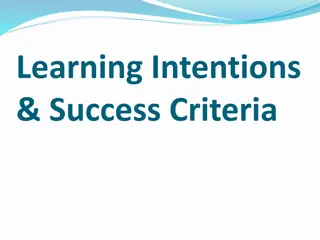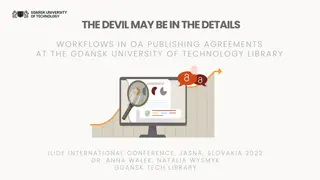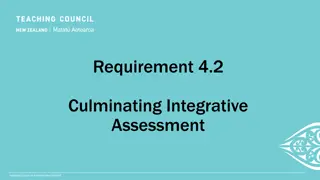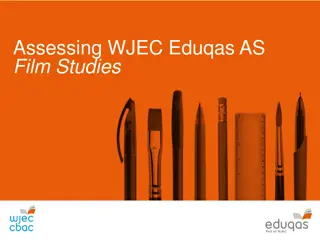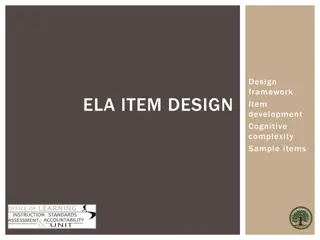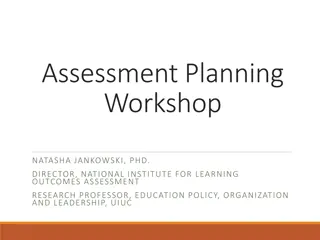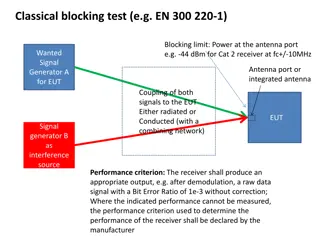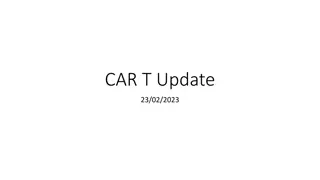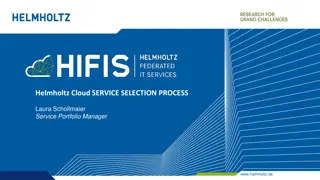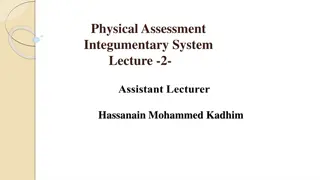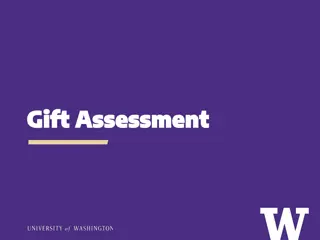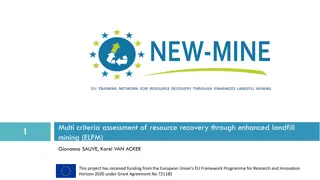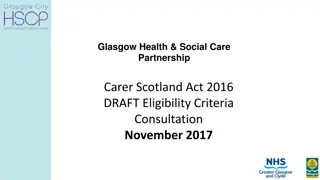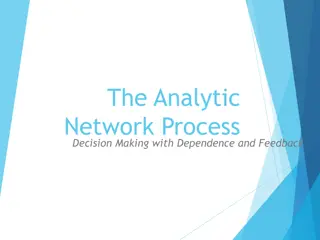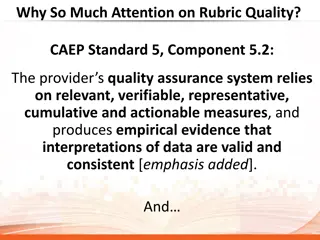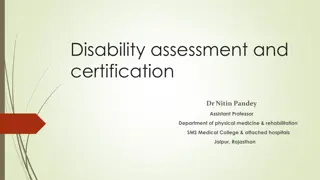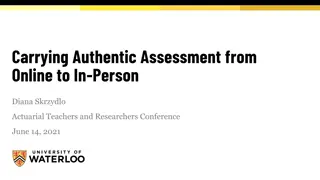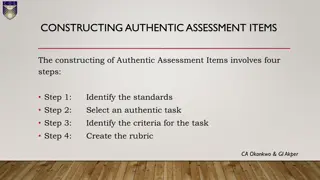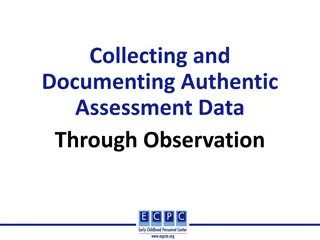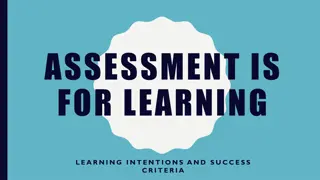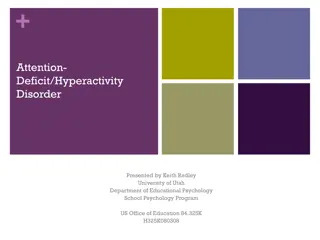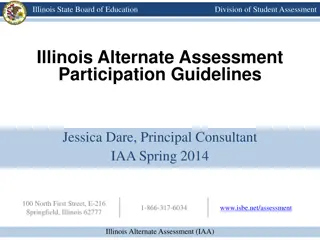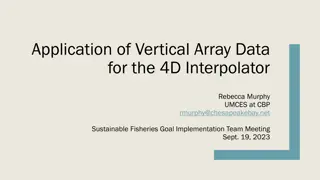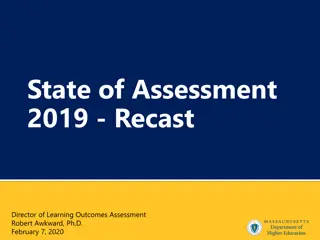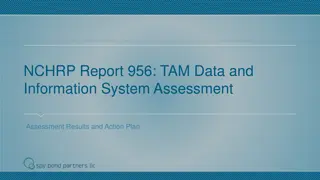Sheffield Early Help Assessment Form Update and Integration with Extended Support Plan
Sheffield has introduced an updated Early Help Assessment form to streamline the assessment process within the Early Help System. This new form combines the Early Help Assessment with the Extended Support Plan, aligning various assessment tools and referral forms into one comprehensive document. The
5 views • 22 slides
Enhancing Language Learning Through Peer Assessment
Explore the benefits of peer assessment as a valuable tool for language learning, comparing it with self-assessment. Discover the components and challenges of self-assessment, along with the potential of peer assessment to improve accuracy and promote self-regulation. Gain insights into what peer as
3 views • 29 slides
Overview of DSW End Point Assessment Team Leader Level 3
DSW End Point Assessment Team Leader Level 3 provides a clear understanding of the assessment process, ensuring individuals comprehend why and when it occurs, responsibilities involved, and how DSW supports them. It covers topics such as what End Point Assessment entails, assessment design and deliv
1 views • 18 slides
Understanding Learning Intentions and Success Criteria
Learning intentions and success criteria play a crucial role in enhancing student focus, motivation, and responsibility for their learning. Research indicates that students benefit greatly from having clear learning objectives and criteria for success. Effective learning intentions should identify w
1 views • 24 slides
Insights into Open Access Publishing Agreements at Gdansk University of Technology Library
Delve into the detailed workflows and criteria surrounding Open Access publishing agreements at the Gdansk University of Technology Library, including transformative agreements, subscription criteria assessment, open access criteria assessment, and eligibility workflows for authors and articles. Exp
0 views • 11 slides
Culminating Integrative Assessment Framework Overview
The Culminating Integrative Assessment (CIA) is a key component in evaluating a student teacher's ability to integrate theory with practice and synthesize their learning across various standards. This assessment, conducted towards the end of the program, must be credit-bearing and based on authentic
2 views • 12 slides
Understanding Assessment in Medical Education
Exploring the concepts of assessment in medical education, including defining assessment, types of assessment, reliability, validity, and aligning assessment methods with intended learning outcomes. The importance of constructive alignment and the impact of assessment on learning outcomes are also d
1 views • 12 slides
Understanding and Applying Assessment Criteria in Film Studies
Ensuring objectivity in assessing students' responses is crucial in film studies. Differentiate between formative and summative assessments for a comprehensive evaluation of student understanding. Understand assessment criteria to accurately evaluate objective knowledge and exercise academic judgmen
2 views • 30 slides
Assessment Matters in Sociology: Enhancing Learning Through Evaluation
Explore the significance of assessment in sociology education, focusing on key questions to evaluate current assessment procedures, review individual course assessments, and develop strategies to enhance student learning outcomes. Delve into the centrality of assessment in the learning process, with
1 views • 15 slides
Comprehensive Framework for Designing and Developing Educational Assessment Items
Explore a holistic approach to designing assessment items in education, focusing on cognitive complexity, learning progression, assessment quality, alignment framework, and criteria for measuring alignment degree. Learn about universal design principles, grade appropriateness considerations, and ite
1 views • 22 slides
Insights into Managing Assessment in the Classroom by Assessment Research Group
Explore the importance of standards and assessment in education through the lens of the Assessment Research Group. Gain valuable perspectives on curriculum delivery, understanding the assessment system, learner assumptions, task parameters, and more. Discover how language, structure, and agency play
2 views • 25 slides
Workshop on Assessment Planning by Dr. Natasha Jankowski
Dr. Natasha Jankowski, Director of the National Institute for Learning Outcomes Assessment, conducts a workshop focusing on effective use of assessment data to enhance undergraduate education. The workshop covers areas like evaluating assessment plans, program learning outcomes, and assessment rubri
0 views • 30 slides
Classical Blocking Test and Receiver Performance Criteria
Classical blocking test procedures such as EN 300.220-1 outline limits on power at the antenna port for receivers, with criteria for achieving desired performance levels without errors. Manufacturers must declare appropriate performance criteria for devices, even if certain performance metrics are n
0 views • 6 slides
Enhancing Understanding through Assessment in Educational Design Workshop
Learn and collaborate on assessment practices in education design at the "Understanding by Design Assessment Focus" workshop. The agenda includes sessions on summative and formative assessment, feedback, reporting, and more. Engage in activities like generating questions, finding destination partner
1 views • 76 slides
Institutional Assessment Planning Workshop Feedback and Insights
Feedback and insights from a recent institutional assessment planning workshop led by Dr. Mark Nicholas at FSU S. Warren Conference Center & Inn. Participants provided feedback on the usefulness of the content, presenter knowledge, ability to develop assessment plans, post-training assessment knowle
1 views • 9 slides
Update on CAR T-Cell Therapy and Approval Criteria Changes
Recent updates regarding CAR T-cell therapy include details on patient referrals, treatments, and changes to approval criteria. The information highlights patient outcomes, referral processes, and criteria updates for various types of lymphomas. It also discusses the importance of monitoring and adj
2 views • 9 slides
HelmholtzCloud Service Selection Process Overview
The Helmholtz Cloud Service Selection Process is detailed through service surveys, iterations, criteria types, and exclusion processes. Service providers deliver data, weighting and selection criteria are applied, and candidate services are listed based on surveys and integrations. Criteria categori
0 views • 41 slides
Understanding Higher Education Assessment: The Complete Guide
Higher education assessment involves a systematic process of collecting, reviewing, and utilizing information to improve student learning and development. This guide covers the assessment cycle, learning outcomes, the mission behind assessment in higher education, what assessment is and is not, reas
1 views • 36 slides
Integumentary System Assessment Techniques Lecture
Explore the physical assessment techniques for the integumentary system, focusing on the skin, hair, and nails. Learn about inspection and palpation methods, nail assessment criteria including shape variations, and skin assessment parameters such as color, texture, and pigmentation. Discover how to
0 views • 22 slides
Understanding Gift Assessment Process at University of Washington
The Gift Assessment Process at University of Washington involves applying a 5% assessment to select current-use gifts over $1,000 and under $5 million. This assessment supports the university's advancement efforts and institutional priorities by transferring 5% of eligible contributions to the Provo
1 views • 5 slides
Overview of Environmental Impact Assessment and Strategic Environmental Assessment Directives
Environmental Impact Assessment (EIA) and Strategic Environmental Assessment (SEA) play crucial roles in evaluating the impact of planned activities on the environment. This content delves into the concept, origins, development, and key elements of environmental assessment, discussing the legal fram
2 views • 35 slides
Enhanced Landfill Mining: Multi-Criteria Assessment for Resource Recovery
This project delves into the assessment of resource recovery through Enhanced Landfill Mining (ELFM) using a multi-criteria approach. It explores the goals, drivers, and objectives of ELFM, emphasizing environmental protection, societal benefits, and economic considerations. The study highlights the
0 views • 18 slides
Glasgow Health & Social Care Partnership Carer Support Criteria
The Carers (Scotland) Act 2016 mandates the implementation of eligibility criteria by Health & Social Care Partnerships to address carer needs effectively. Glasgow's eligibility criteria prioritize fair resource allocation based on carers' identified support needs. Key principles include universal c
0 views • 8 slides
Nutrient Criteria Development Plan for High Rock Lake Summary Update
Nutrient Criteria Development in North Carolina has evolved through various stages since 2001, with the key milestones being the development of the Nutrient Criteria Implementation Plan in 2004 and the Nutrient Criteria Development Plan in 2014. The plan aims to link nutrient concentrations with the
0 views • 8 slides
Institutional Assessment and Effectiveness Workshop Achievements at SUNY Oneonta
The Office of Institutional Assessment and Effectiveness at SUNY Oneonta has made significant progress in developing assessment protocols and processes, leading to a culture of assessment. This includes completing planning and assessment cycles, establishing objectives and procedures, and aligning u
1 views • 16 slides
Analytic Network Process: Decision Making and Feedback
Explore the Analytic Network Process for decision-making with dependence and feedback. Compare hierarchical and network models, prioritize criteria in AHP and ANP, establish car priorities based on criteria, and employ feedback to link alternatives to criteria for preference. Make pairwise compariso
0 views • 19 slides
Enhancing Rubric Quality in Educational Assessment
The focus on rubric quality in education, particularly in meeting CAEP Standard 5, Component 5.2 for quality assurance systems, is crucial for generating valid, reliable, and actionable data. CAEP now allows early submission of assessment instruments to improve data quality. However, common weakness
0 views • 22 slides
Oregon Department of Education Assessment and Accountability Resources
Access important information on assessments, accountability, and reporting from the Oregon Department of Education. Find resources on updating assessment records, accessing student scores, and staying informed about assessment requirements for the 2023-24 academic year. Explore links for assessment
0 views • 55 slides
Oregon Department of Education - Assessment Resources and Updates
Explore the Assessment Record Updating Application (ARUA), Accountability Warehouse Extract (AWE), Secure Assessment Reports, and other important tools and information provided by the Oregon Department of Education for assessment data owners, analysts, and partners. Access links for assessment admin
0 views • 54 slides
Disability Assessment and Certification Guidelines by Dr. Nitin Pandey
Disability assessment involves evaluating impairments and functional limitations to determine disabilities, especially in the context of locomotor disabilities. Dr. Nitin Pandey outlines the criteria for certification, highlighting factors like muscle strength, joint motion, coordination, stability,
0 views • 37 slides
Proposal to Update New Mexico Water Quality Standards: Copper Site-Specific Water Quality Criteria for the Pajarito Plateau
Develop a proposal for the New Mexico Water Quality Control Commission to adopt EPA's 2007 recommended copper ambient water quality criteria, focusing on the history of U.S. EPA aquatic life criteria for copper, the use of the BLM tool in aquatic toxicology, and the overview of proposed site-specifi
0 views • 10 slides
Enhancing Teaching Assessment for Actuarial Education
Exploring the transition of assessment practices from online to in-person settings, this presentation by Diana Skrzydlo at the Actuarial Teachers and Researchers Conference delves into the purpose of assessment, key principles, and activities for effective evaluation. Discover insights on diagnostic
0 views • 10 slides
Constructing Authentic Assessment Items: A Guide in 4 Steps
Constructing authentic assessment items involves four steps: identifying standards, selecting an authentic task, defining criteria, and creating a rubric. Standards are specific skills and knowledge students should gain. Tasks should reflect these standards. Criteria measure student mastery. Rubrics
0 views • 25 slides
Authentic Assessment through Systematic Observation: Best Practices
Explore the process of authentic assessment through systematic observation in early childhood education. Learn about collecting, documenting, and interpreting assessment data using evidence-based practices and technology. Discover the importance of working collaboratively with families and professio
0 views • 53 slides
Maximizing Student Learning Through Effective Assessment Strategies
Explore the importance of assessment for learning, learning intentions, and success criteria in educational settings. Discover how to create and implement effective learning intentions, success criteria, formative assessment, and feedback practices to drive student progress and achievement. Dive int
0 views • 49 slides
Understanding ADHD Subtypes and Diagnosis Criteria in DSM-IV-TR
ADHD, as defined in the DSM-IV-TR, encompasses three subtypes: Predominantly Inattentive Type, Predominantly Hyperactive-Impulsive Type, and Combined Type. To meet diagnostic criteria for each subtype, specific symptoms must be present for a certain duration and at a degree that is maladaptive. Indi
0 views • 23 slides
Illinois Alternate Assessment Participation Guidelines
The Illinois State Board of Education's Division of Student Assessment provides guidelines for participation in the Illinois Alternate Assessment (IAA). Students with significant cognitive disabilities, typically with intellectual functioning below average and impairments in adaptive functioning, ar
0 views • 9 slides
4D Interpolator Development for Sustainable Fisheries Assessment
Development of a 4D interpolator tool to assess and improve sustainable fisheries criteria with higher frequency data and advanced computing techniques. The project involves a multidisciplinary team led by Rebecca Murphy at UMCES, focusing on water quality assessment and criteria evaluation. The tim
0 views • 16 slides
Assessment Practices in Higher Education Institutions
Dive into the state of assessment for the year 2019, featuring insights on hosting assessment days, establishment of assessment committees, implementation of institutional and program learning outcomes, appointment of a Director of Assessment, compensation for faculty members focusing on assessment,
0 views • 8 slides
NCHRP Report 956 TAM Data and Information System Assessment
This content provides an overview of NCHRP Report 956 focusing on the TAM data and information system assessment results and action plan. It includes details on assessment outcomes, recommendations, implementation action plans, and tools for self-assessment and improvement methodology. The content a
0 views • 21 slides



